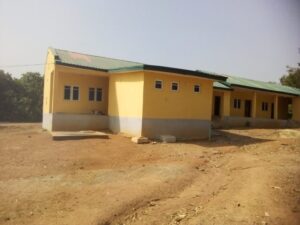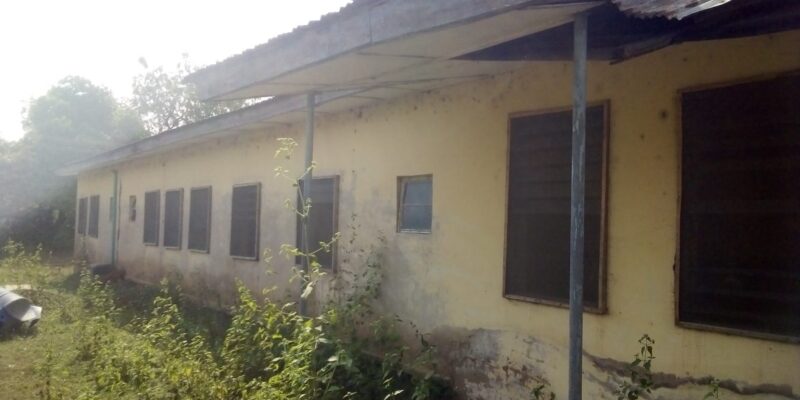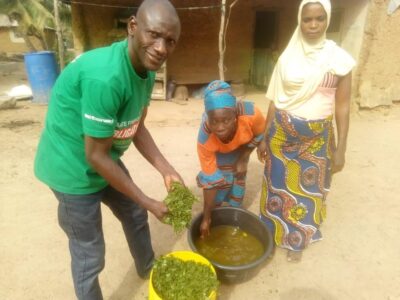By Adewale Adeyemi
On a chilly Tuesday morning, Baba Ridiwan, a resident of Joromo Isin community, embarked on a journey to the FUFU community to seek treatment for his about six-month-old baby exhibiting symptoms of malaria.
Accompanied by his wife, who held the baby on her back while riding pillion on a motorcycle, the couple covered several miles to reach the Primary Health Care Center in FUFU for the baby’s malaria treatment.
Navigating through treacherous roads and challenging weather conditions, the couple arrived at the health center only to find themselves waiting for several minutes, as health officials attended to other patients.
In their eagerness to receive prompt attention for their baby, the couple swiftly detailed the exhibited symptoms to the health officials. The young child was promptly treated, administered necessary medications, and subsequently discharged for the journey back home.
Upon returning to their community amidst the adversities faced, Baba Ridwan expressed frustration at having to travel considerable distances to access healthcare for his daughter.
He underscored the importance of the government revitalizing the primary health care center in Joromo Isin, which has remained nonfunctional since the tenure of the late Governor Mohammed Alabi Lawal.
“We appeal to the state government to help us rebuild the hospital. The facility used to provide healthcare services to residents when it was operational. Now, we are compelled to travel to nearby communities like FUFU and Idofian for medical care, which is inconvenient due to the distance and the poor condition of the road.”
To expedite malaria treatment for children under five and enhance global health delivery, the World Bank initiated the Immunization Plus and Malaria Process by Accelerating and Transparency (IMPACT) program, allocating $100,000 to the state governments.
According to the World Bank, implementing the IMPACT fund is a way of appreciating the state. World Health Organisation’s, Walter Mulombo, during the flag-off of the IMPACT program in Kwara, said; “Of course, this is part of the way in which the WHO appreciated Kwara State.”
Mulombo was represented by the North Central Coordinator for the World Health Organisation, Asma’l Kabir.
State Government Confirms Receipt and Explains Utilization Plan
The Kwara state government, upon fulfilling the counterpart payment, received the funds, intending to enhance the infrastructure of Primary Health Care Centers.
Rafiu Ajakaye, the Chief Press Secretary of the Kwara Governor, highlighted the significance of the funds for improving healthcare infrastructure.
He emphasized the allocation of funds directly to the Kwara State Primary Health Care Development Agency (KWPHCDA) and the beneficiary local government, thus facilitating efficient utilization without the need for additional approvals.
“Reducing under-five mortality in Nigeria is critical for human capital accumulation in the country and Sub-Saharan Africa. Nigeria ranks 152nd out of 157 on the Human Capital Indes (HCT) (154th on child survival) and has the highest under-five child mortality rate (USMR) of any lower middle-income country (LMIC).”
“To address this crisis, the Government of Nigeria has committed itself to improve its human capital with the goal of reducing under-five mortality by half by 2030.”
“The IMPACT project was developed in support of this compelling commitment. IMPACT is the first phase of a longer-term multiphase programmatic approach (MPA), which addresses a key pillar of the human capital index.”
According to the KWPHCDA, most of the burden of childhood illness is easily prevented or treated: Almost 87% of Under-Five Child Mortality rate In Nigeria, excluding neonatal mortality, is due to malaria, pneumonia, diarrhea, and three other vaccine-preventable diseases measles, pertussis, and meningitis.
It added that “the project development objective (PDO) of the first phase (IMPACT) is to improve the utilization and quality of immunization plus and malaria services in selected states. Immunization plus services refer to immunization, maternal, child, and neonatal services.”
The Kwara Primary Health Care Agency, in a letter signed by Dr. M.s. Oguntoye for the Executive Secretary of the agency, Dr.Nusirat Elelu further stated that “Each benefitting state was required to pay a counterpart fund of 36 million only.”
KWSPHCDA added that “the primary beneficiaries of this project and program are children under five and women in participating states, and the project interventions will also improve access to health services for all other residents of the participating states.”
Concern Over Fund Utilization
As stated earlier by the Chief Press Secretary and the KWSPHCDA, the IMPACT fund is structured for the infrastructural development of Primary Health Care and to improve the quality of Immunization Plus and Malaria services among children under five and women.
However, despite the fund’s availability, worries persist regarding the state of infrastructure and the execution of responsibilities by the Primary Health Care centers in the Ilorin South Local Government Area of Kwara state.
In Bada-Ajegunle, renovation, painting, and some other construction works were carried out at the front view and the interior of the Ifedapo Clinic and Maternity, catering to Bada, Abelu, and Agara communities.
Despite the renovation done at the front view of the health care center, an anonymous patient narrated her experience during her visit to the PHC. The patients, who visited the hospital to seek malaria treatment for a three-year-old boy shared experiences about the condition of the toilet and narrated how patients get drugs.
Describing the condition of the restroom, the mother of two boys highlighted its non-functionality due to damage and underscored the scarcity of available medications for her son.
The patient further disclosed that despite the government’s failure to supply drugs to the health officials, the dedicated staff made sure to provide necessary medications for the patient’s requirements.
“The personnel here are performing commendably. Despite the relatively modest population of the communities, they make efforts to stock the center with drugs, even though the government hasn’t allocated funds for them.”
“Initially, the government supplied malaria test kits, but once exhausted, no replacements were furnished.”
“The staff, on their way to work, use their own funds to purchase drugs, which they then sell to us. This is how we obtain medications as patients. The government isn’t supplying drugs to them.”
“We implore the government for assistance. We require the medications. They have done well in ensuring the center functions, but it is incomplete without the necessary drugs for the patients.”
Residents also appealed to the state government to facilitate access to water supply. They highlighted the inconvenience faced by workers who have to cover long distances to fetch water for the health facility.
They additionally called upon the state government to furnish accommodation for the health workers, emphasizing that this provision would enable them to fulfill their responsibilities more effectively, given that many of the health workers commute from Ilorin, the state capital.
At Jalala Primary Health Care Centre, a health facility constructed to cater to the approximately 20,000-strong Oke-Odo community and its environs health needs.
With about five wards and residential apartments for the health workers, the health facility treats approximately five children with malaria daily, according to a health official, who spoke on condition of anonymity, due to the inability to communicate with the media or disclose center details.
After a visit to the facility, Mama Abike commended the diligent efforts of the health officials, acknowledging their effective treatment of patients. She also affirmed the availability of medications within the health center.
Mummy Abike, a mother of one, noted that the health facility is well-equipped with injections and essential medications for children suffering from various ailments such as malaria, Apollo, and other infections.
Likewise, the Magaaji-Ajomu and FUFU Primary Health Centre, designed to cater to the Majaaji-Ajomu and FUFU communities, are operational and maintain favorable infrastructural conditions.

Magaaji-Ajomu Health Care Centre
Residents from both communities expressed satisfaction, affirming that the health centers effectively address their needs as well as those of neighboring communities.
However, the situation takes a different turn in Ilota and Apaola communities. Located in Akanbi Ward 1, this community has the Apaola-Ilota Primary Health Care Centre catering to the health needs of its residents.
The front view of the health facility had undergone renovation and repainting, other structures within the facility, including the supposed accommodation for health workers and the rear view of the hospital building, presented a visually distressing sight.
Mama Jamiu, a patient and resident of Ilota community acknowledged the functionality of the health centre but highlighted that health workers sometimes commence duty late and close as early as 3:00 pm due to the lack of accommodation, forcing them to reside in Ilorin.
She appealed to the state government to provide accommodation and medication for the health facility, as residents often find themselves having to purchase prescribed drugs from pharmacies after being attended to by the health workers.
“The health center is operational, but as you can see today (Tuesday, December 26, 2023), the health workers are not on duty because they stay in Ilorin. Sometimes they close by 3:00 pm to quickly get home due to the absence of accommodation.
“The accommodation building in the center is in poor condition and uninhabitable. Sometimes, we also need to buy prescribed drugs for our children after being attended to by the health workers.
“They claim the government did not provide drugs for them, as they ration them to other health facilities because the population utilizing our facility is not substantial. However, our children often suffer from fever, and it is challenging for us to travel to other communities miles away to purchase drugs.”
Seeking clarity on the utilization of the IMPACT FUND, this reporter, faced with unsuccessful attempts to secure an interview with Dr. Nusirat Elelu, the Executive Secretary of KWPHCDA, submitted a formal request to the ministry.
The request sought information on the fund’s purpose, the list of primary healthcare centers benefiting from it, their locations, and the allocated amounts for enhancing their facilities.
In addition, this reporter pressed for comprehensive details regarding the utilization of the allocated funds. This included specifics on infrastructural development, procurement of medical equipment, capacity-building programs, and any other relevant expenses incurred during the improvement of the health centers.
The Primary Health Care Agency, while giving details of the beneficiaries of the IMPACT fund in a letter signed by Dr. M.S Oguntoye for the Executive Secretary of the agency, Dr. Nusirat Elelu said “The beneficiary facilities in the first phase of the Project are the Basic Health Care Provision Fund supported facilities in the 193 political wards of the State.
The statement said the idea is to bring those facilities to a Level 2 PHC where they will be able to meet the basic primary healthcare needs of their immediate catchment.”
When asked to give details of the utilization of the fund in each PHC, the KWSPHCDA said “The utilization of the funds is based on a comprehensive gap analysis done and cost by the benefitting health facilities.”
It added that “the facilities were to utilize the investment funds in line with the approved plans they developed and approved by the National Primary Health Care Development Agency and the World Bank and endorsed by the Officers in charge of health facilities and their respective Ward Development Committee Chairmen.”
The KWSPHCDA, however, failed to provide the utilization plan while responding to the letter from the journalist, stating that “the details of the plan are available in each of the benefitting facilities.
The absence of a comprehensive plan outlining the allocation of funds, grievances from residents of certain Primary Health Care (PHC) facilities within the local government regarding the lack of malaria drugs for patients, and the deplorable infrastructural state of some health centers have prompted inquiries into the utilization of the allocated 4.6 million naira for each PHC.
However, despite the fund’s availability, worries persist regarding the state of infrastructure and the execution of responsibilities by the Primary Health Care centers in the Ilorin South Local Government Area of Kwara state.
Established in 1996, Ilorin South Local Government constitutes one of the sixteen local government areas in Kwara. It comprises three districts and ten wards, with a population of 208,691 according to the 2006 census.
In Kwara state, there are a total of 994 health centers, including 782 Primary Health Centers (PHCs), 209 secondary centers, and 3 tertiary health centers. The distribution comprises 661 public health centers and 333 private health centers, according to the Nigeria Health Facility Registry. It further disclosed Ilorin South Local Government boasts more than thirty-six Primary Health Care centers.










Comments